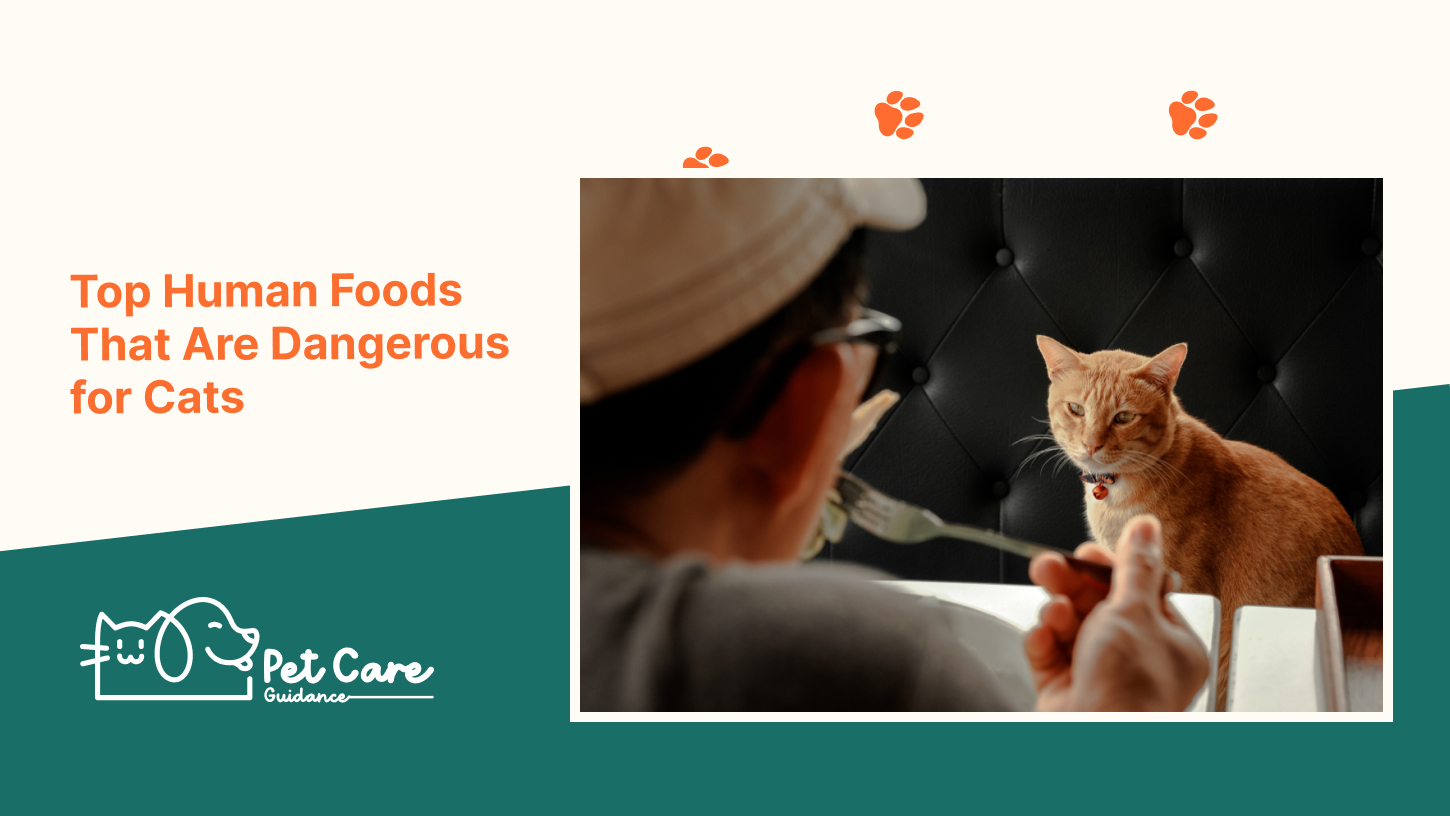Some human foods that are dangerous for cats include chocolate, salt, citrus fruits, avocados, tuna, caffeine, and alcohol. These foods can cause various health issues and even be toxic to cats.
It is important to keep these foods out of their reach and ensure they are not accidentally ingested. Cats have different nutritional needs than humans, and feeding them the wrong foods can lead to serious consequences. Therefore, it is crucial to be aware of what human foods are safe and appropriate for cats to consume.
We will explore the top human foods that are dangerous for cats, highlighting the potential risks and harm they can cause.
Chocolate
Chocolate is one of the most well-known human foods that is extremely dangerous for cats. While humans enjoy this sweet treat, it can have severe consequences for feline friends. It is important for cat owners to be aware of the potential risks associated with chocolate consumption and to prevent their cats from accidentally ingesting it.
Theobromine The Harmful Compound in Chocolate
One of the main reasons why chocolate is dangerous for cats is because it contains a compound called theobromine. Theobromine is a stimulant that affects the central nervous system and cardiovascular system of cats. While humans can metabolize theobromine relatively easily, cats lack the necessary enzymes to break it down, leading to toxic buildup in their system.
The effects of theobromine toxicity in cats can be devastating. It can cause increased heart rate, tremors, seizures, abnormal heart rhythm, and even death in severe cases. Therefore, it is crucial to keep all chocolate products out of your cat’s reach to prevent accidental ingestion.
Types of Chocolate That Are Most Toxic to Cats
It is important to note that not all types of chocolate are equally toxic to cats. The darker the chocolate, the higher the concentration of theobromine. Therefore, dark chocolate and unsweetened baking chocolate pose the greatest risk to feline health.
Milk chocolate, while less toxic than dark chocolate, can still be harmful if consumed in large quantities. White chocolate, on the other hand, contains very little theobromine and is unlikely to cause significant harm to cats.
As a responsible cat owner, it is essential to be vigilant and keep all chocolate products safely stored away from your feline companion. If you suspect your cat has ingested chocolate or is showing signs of chocolate toxicity, such as vomiting, diarrhoea, rapid breathing, or restlessness, it is crucial to seek veterinary attention immediately.
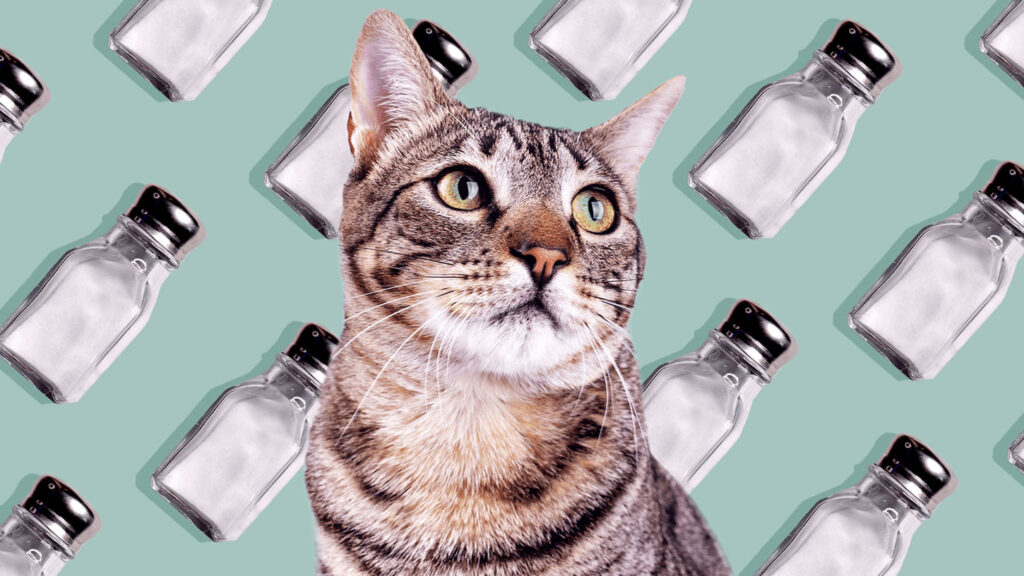
Salt The Dangers of Too Much Salt for Cats
Salt is a common ingredient found in many human foods, adding flavour and enhancing the taste of various dishes. However, when it comes to our feline friends, salt can be extremely dangerous if consumed in excess. Cats have different dietary requirements than humans, and their bodies are not equipped to handle the high levels of salt found in certain foods. It is important for cat owners to understand the dangers of salt and the potential harm it can cause to their furry companions.
Symptoms of Salt Poisoning in Cats
Excessive salt consumption can lead to salt poisoning in cats, also known as hypernatremia. This condition arises when there is an imbalance of sodium levels in the blood, causing dehydration and other serious health issues. Some common symptoms of salt poisoning in cats include excessive thirst, increased urination, diarrhea, vomiting, lack of appetite, seizures, and even coma in severe cases. It is crucial for cat owners to be vigilant about preventing their cats from ingesting salty foods to avoid these harmful effects.
Salty Human Foods to Avoid for Cats
Now that we are aware of the dangers of excessive salt for cats, let’s discuss some human foods that are particularly high in salt and should be kept away from our feline companions. These examples serve as a cautionary reminder to never share these treats with our cats.
1. Deli Meats: Deli meats like ham, salami, and bacon are often heavily processed and contain high levels of sodium. These can be dangerous for cats due to their salt content and preservatives.
2. Canned Soup and Broth: Canned soups and broths are convenient for humans, but they are typically loaded with salt to enhance flavour and extend shelf life. Feeding these to your cat can result in excessive sodium intake, leading to potential health complications.
3. Cheese and Dairy Products: While cats are known for their love of dairy, many cheese and dairy products contain high levels of sodium. Too much cheese can lead to stomach upset, obesity, and increased risk of heart disease in cats.
4. Potato Chips and Pretzels: These popular snacks are not suitable for cats due to their high sodium content and unhealthy additives. The high salt levels can lead to dehydration and kidney issues in cats if consumed in excess.
5. Processed Meats and Fast Foods: Hot dogs, sausages, fast-food burgers, and other processed meats are often loaded with salt and other additives that can be harmful to cats. These foods should be kept far away from our feline friends’ reach.
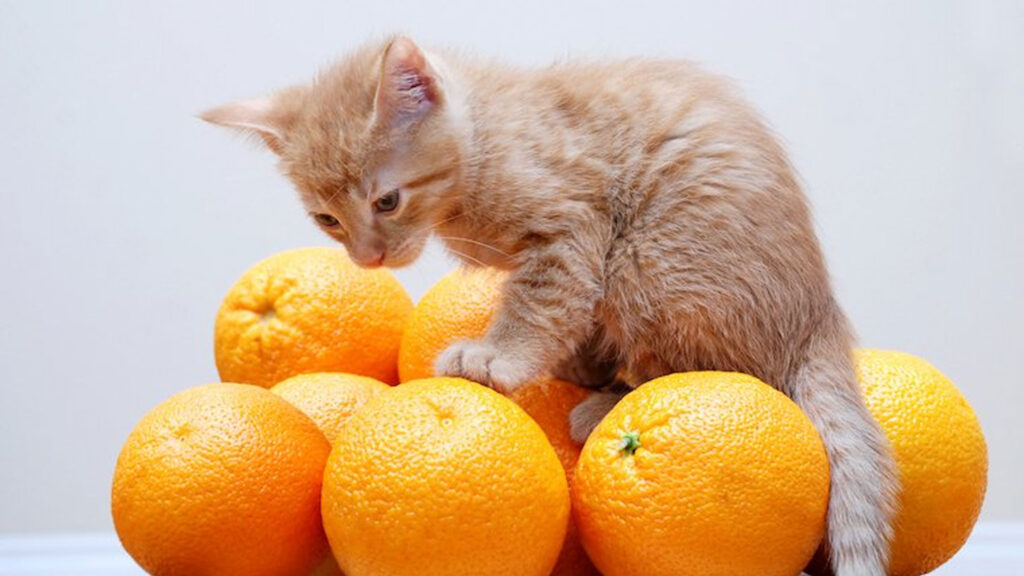
Discuss why citrus fruits and their oils are dangerous for cats
Citrus fruits, such as oranges, lemons, limes, and grapefruits, contain compounds that can be toxic to cats. The main offenders are the essential oils found in the peel, flesh, and leaves of these fruits. Citrus oils are high in a chemical compound called d-limonene, which is known to be harmful to cats. When cats ingest citrus fruits or come into contact with the oils, it can cause a range of adverse reactions and potential health risks.
Explain the potential risks and adverse reactions in cats who consume citrus
When cats consume citrus fruits or oils, it can lead to a variety of health issues and adverse reactions. Some potential risks include:
- Upset stomach: Citrus fruits can cause gastrointestinal upset in cats, leading to symptoms such as vomiting and diarrhoea.
- Photosensitivity: Certain compounds in citrus fruits can make cats more sensitive to sunlight, resulting in skin irritations and sunburns.
- Oral ulcers: The acidic nature of citrus fruits can injure the delicate tissues in a cat’s mouth, causing painful ulcers to form.
- Respiratory distress: Inhalation of citrus oils can irritate a cat’s respiratory system, leading to difficulty breathing, coughing, or wheezing.
Mention specific citrus fruits and products to avoid giving to cats
When it comes to citrus fruits and products, it’s best to steer clear and avoid giving them to your feline friend. Ensure your cat does not have access to:
- Oranges
- Lemons
- Limes
- Grapefruits
- Any other citrus fruits
- Citrus essential oils
- Citrus-scented products, such as cleaning sprays or air fresheners
By being cautious and keeping citrus fruits and oils away from your cat, you can help protect them from potential harm and ensure their overall well-being.
Explain why avocados are dangerous for cats
While avocados may be a favourite among humans, they can be highly toxic to cats. This stone fruit contains a substance called persin, which is harmless to humans but can cause serious health issues in our feline friends. It is important to understand that all parts of the avocado, including the flesh, skin, pit, and even the leaves, can lead to toxicity in cats.
Discuss the specific component in avocados that is toxic to cats
Persin, the toxic component found in avocados, is a fungicidal toxin that is naturally present in the fruit. While it is generally harmless to humans and other animals, cats lack certain enzymes necessary to break down and metabolize this compound. As a result, the accumulation of a person in a cat’s system can lead to various health problems and even be life-threatening.
Mention the potential symptoms of avocado toxicity in cats
Avocado toxicity in cats can manifest in a range of symptoms, which can vary in severity depending on the amount of person ingested. Some common signs of avocado toxicity in cats include:
- Vomiting
- Diarrhea
- Lack of appetite
- Abdominal pain
- Difficulty breathing
- Swollen, inflamed throat
- Lethargy or weakness
If you suspect that your cat may have ingested avocado or is showing any of these symptoms, it is essential to seek immediate veterinary care. Prompt treatment can greatly improve the chances of a successful recovery and minimize the potential complications associated with avocado toxicity.
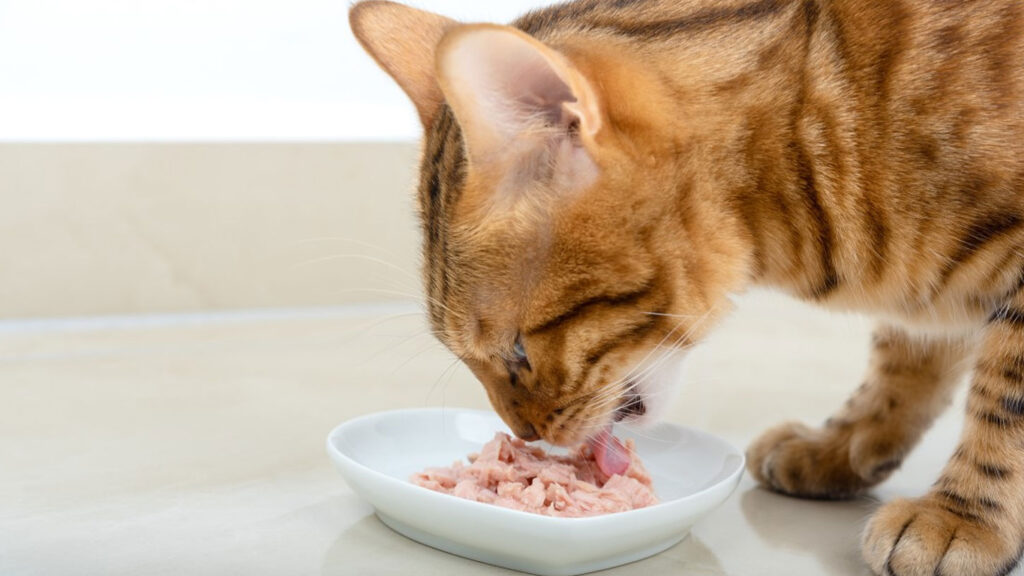
Discuss the risks associated with feeding cats too much tuna
Feeding cats canned tuna may seem like a treat, but it’s important to be aware of the risks involved. While small amounts of tuna are generally safe, feeding too much tuna to your feline friend can have negative consequences on their health.
One risk of feeding cats too much tuna is the possibility of developing an imbalance in their diet. Tuna lacks certain vital nutrients that cats need for optimal health. It is also low in vitamin E, which plays a crucial role in their immune system. A diet heavily reliant on tuna can lead to deficiencies and health issues in the long run.
Another major risk of excessive tuna consumption is that it can lead to mercury poisoning in cats. Tuna is known to contain high levels of mercury, a toxic heavy metal that can accumulate in the body over time. Even in small amounts, mercury can cause damage to a cat’s nervous system, kidneys, and liver.
Mention the potential negative effects of mercury in tuna on cats
Mercury toxicity is a serious concern when it comes to feeding cats tuna. The high levels of mercury in tuna can lead to a range of negative effects on a cat’s health. Some potential symptoms of mercury poisoning in cats include:
- Vomiting and diarrhoea
- Loss of appetite
- Weight loss
- Weakness and lethargy
- Seizures
- Impaired coordination
- Behavioural changes
If you notice any of these symptoms in your cat after feeding them tuna, it is crucial to seek veterinary care immediately. Prompt treatment can help minimize the damage caused by mercury toxicity.
Provide alternatives to feeding tuna to cats
Fortunately, there are plenty of alternatives to feeding tuna to your cat that can provide them with the nutrients they need without the associated risks. Some safe and healthy alternatives include:
- Chicken: Cooked chicken is a lean source of protein that most cats enjoy. Just make sure to remove the bones and any seasonings before serving.
- Sardines packed in water: Sardines are a great source of omega-3 fatty acids and can provide a nutritional boost to your cat’s diet. Be sure to choose sardines packed in water rather than oil or sauces.
- Eggs: Cooked eggs can be a nutritious and protein-rich addition to your cat’s diet. Make sure they are thoroughly cooked to avoid the risk of salmonella.
- Yoghurt: Plain, unsweetened yoghurt can be a beneficial treat for cats. It contains probiotics that can promote a healthy digestive system. Just remember to introduce it gradually, as some cats may be lactose intolerant.
By incorporating these alternatives into your cat’s diet, you can ensure that they receive a well-rounded and balanced meal without the potential dangers of excessive tuna consumption.
Explain why caffeine is dangerous for cats
Caffeine, which is found in various beverages and food products, is toxic to cats. While it may be a beloved pick-me-up for humans, it poses serious health risks for our feline friends. Unlike us, cats lack the necessary enzymes to metabolize caffeine efficiently, making them more susceptible to its adverse effects. When ingested, caffeine stimulates the central nervous system, causing a variety of dangerous symptoms in cats. It is crucial for cat owners to understand the dangers of caffeine consumption and ensure that their furry companions are kept away from any products containing this harmful substance.
Discuss the adverse effects of caffeine on cats’ cardiovascular system
The impact of caffeine on cats’ cardiovascular system can be extremely detrimental. When cats consume caffeine, it acts as a stimulant, increasing their heart rate and blood pressure. This can lead to cardiac arrhythmias, palpitations, and even life-threatening conditions such as hypertrophic cardiomyopathy. The rapid heartbeat caused by caffeine can put immense strain on a cat’s heart, potentially leading to heart failure. It is vital for cat owners to be aware of these risks and prevent their cats from accessing any caffeinated products to ensure their cardiovascular health.
Mention specific caffeinated products to avoid giving to cats
When it comes to caffeinated products, cat owners must be vigilant and ensure that their feline companions do not come into contact with them. Avoid feeding any of the following caffeinated products to your cat:
- Coffee
- Tea
- Energy drinks
- Cola or other carbonated beverages containing caffeine
- Chocolate
These items contain varying amounts of caffeine and can cause severe harm to cats if consumed. It is essential to keep these products securely stored and out of reach from cats to protect their well-being.
In conclusion, cats should never be given caffeine due to its toxic effects on their health, particularly their cardiovascular system. As responsible pet owners, it is our duty to ensure that our cats are kept away from any caffeinated products, as even small amounts can have severe consequences.
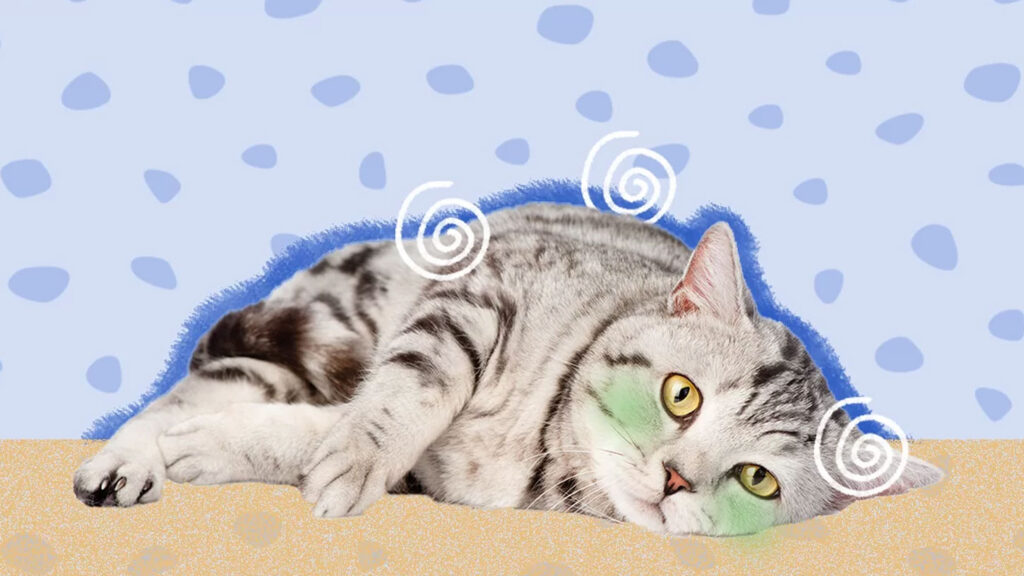
Signs Of Intoxication
If your cat consumes dangerous human food, they can experience food intoxication, which can lead to various symptoms. It is important to be aware of these signs to ensure you can take appropriate action. Here are some common symptoms of food intoxication in cats:
- Vomiting
- Diarrhea
- Loss of appetite
- Lethargy
- Excessive thirst
- Increased or decreased urination
- Weakness
- Tremors or seizures
- Difficulty breathing
- Irregular heartbeat
What to Look Out For
If you suspect that your cat has consumed dangerous human food, there are certain signs and behaviours you should watch out for. These include:
- Visible evidence of food consumption, such as wrappers or empty containers
- Disinterest in regular meals
- Sudden change in behaviour or energy levels
- Excessive grooming or scratching
- Abdominal discomfort, such as bloating or sensitivity to touch
- Abnormal drooling
- Bad breath or mouth ulcers
- Unusual odours on the breath or body
- Unexplained weight loss
Importance of Seeking Veterinary Care
If you notice any signs of food intoxication in your cat, it is crucial to seek veterinary care as soon as possible. While some cases of intoxication may resolve on their own, others can be life-threatening and require immediate medical attention. A veterinarian will be able to assess your cat’s condition, provide necessary treatment, and help prevent any complications that may arise.
Remember, the stomach and digestive systems of cats are different from humans, and certain human foods can be highly toxic to them. Even small amounts can have serious consequences. It is always better to be safe and seek professional help rather than attempting home remedies or waiting for the symptoms to worsen.
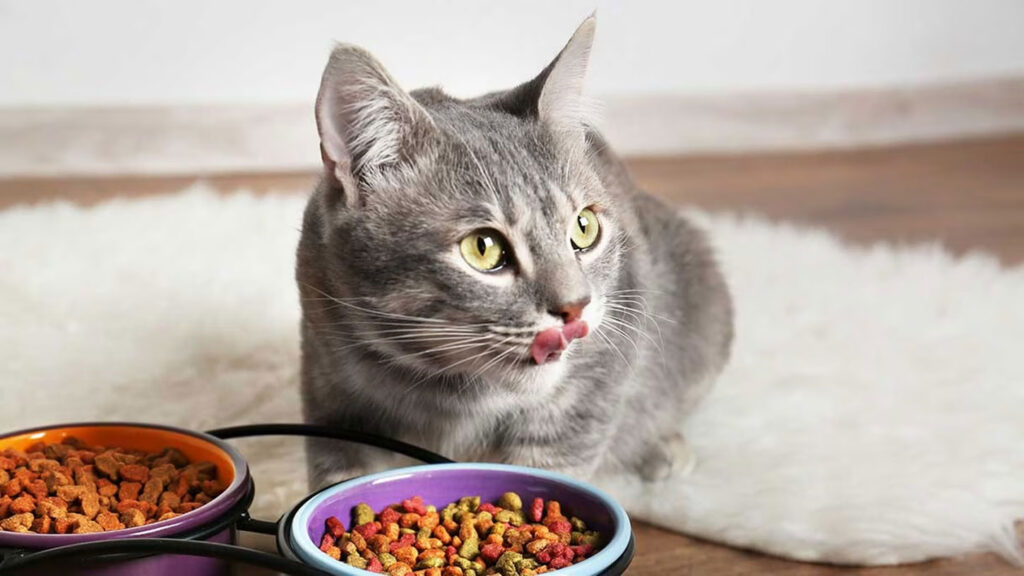
Feeding Your Cat The Same Food
Feeding your cat the same food as you may seem convenient and cost-effective, but it can have serious implications for their health. Cats have specific nutritional needs that differ from humans, and feeding them a balanced diet designed for their needs is crucial for their overall well-being.
A balanced diet ensures that cats receive the proper amounts of essential nutrients like protein, vitamins, and minerals, which are necessary for maintaining healthy skin and coat, supporting their immune system, and promoting optimal organ function.
Provide recommendations for cat food and the dangers of feeding them solely human food
When it comes to feeding your cat, it is important to choose high-quality cat food that is specifically formulated for cats. Look for cat food that is labelled as “complete and balanced” to ensure it meets all their nutritional needs. Avoid feeding cats solely human food, as it can lead to several dangers and health concerns. Human food may lack certain nutrients that are essential for cats, and it may contain ingredients that are toxic to them. Additionally, human food is often higher in calories and can contribute to weight gain and obesity in cats.
To ensure your cat receives the proper nutrition, consider feeding them a combination of wet and dry cat food. Wet cat food provides additional hydration and can be beneficial for cats with urinary tract issues. If you choose to supplement your cat’s diet with human food, consult with your veterinarian to ensure it is safe and appropriate.
Mention the potential long-term health consequences of feeding cats a human food diet
Feeding cats a diet solely consisting of human food can have long-term health consequences. Cats require specific nutrients like taurine, arachidonic acid, and vitamin A, which are often lacking in human food. Deficiencies in these essential nutrients can lead to various health issues, including heart problems, poor vision, and immune dysfunction.
Additionally, feeding cats a diet high in fat and calories from human food can lead to obesity, which can increase the risk of diabetes, arthritis, and other obesity-related conditions. Cats are obligate carnivores, and their bodies are not designed to metabolize carbohydrates efficiently. Therefore, a diet high in carbohydrates from human food can also lead to digestive issues and obesity.
It is important to prioritize your cat’s nutritional needs and provide them with a balanced diet tailored to their specific requirements. Consulting with your veterinarian and choosing high-quality cat food is essential for keeping your cat healthy and ensuring they lead a long and fulfilling life.
Frequently Asked Questions For Top Human Foods That Are Dangerous For Cats
What Are Some Human Foods That Are Bad For Cats?
Some human foods that are bad for cats include chocolate, caffeine, dairy products, onions, garlic, and raw meat. These foods can be harmful to cats and should be avoided to keep them healthy.
What Vegetables Can Cats Not Eat?
Cats should not eat onions, garlic, leeks, scallions, shallots, or chives. These vegetables can be harmful and cause red blood cell damage in cats.
What Human Foods Are Toxic To Pets?
Certain human foods can be toxic to pets, including chocolate, caffeine, alcohol, onions, garlic, grapes, raisins, and raw meat. It is important to keep these foods out of your pet’s reach to avoid any potential health risks.
Can Cats Eat Chocolate?
No, cats should not eat chocolate. Chocolate contains theobromine, which is toxic to cats and can cause symptoms such as vomiting, diarrhoea, rapid breathing, elevated heart rate, and even seizures or death.
Conclusion
From delicious chocolate to refreshing citrus fruits, it’s crucial to remember that some human foods can be harmful to our feline friends. While we may be tempted to share our meals with them, it’s important to prioritize their health and safety.
Foods like chocolate, onions, grapes, and alcohol should never be given to cats as they can cause serious health issues. So, let’s keep our furry companions safe by sticking to a cat-friendly diet and avoiding these dangerous foods. Your cat’s well-being is worth it!


